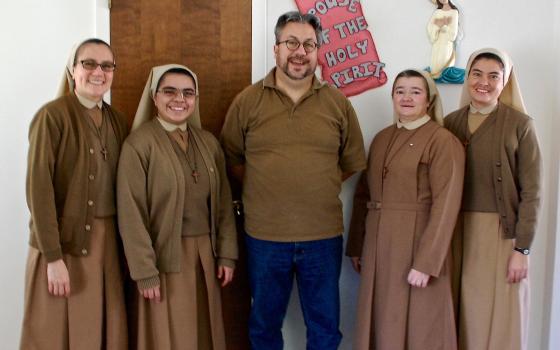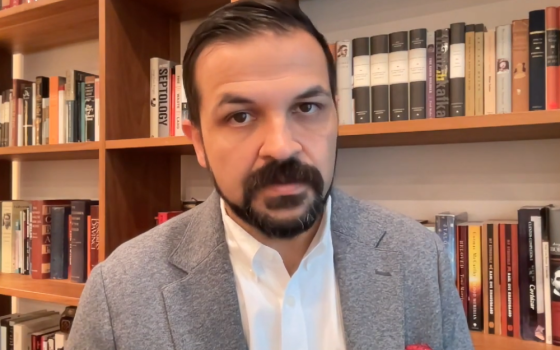The penultimate night at the Democratic convention had three parts: a focus on gun violence; a round of speakers trashing Donald Trump; and the president of the United States. All three sections had their strengths, and all three had their political perils.
Who is not moved by the testimony of the survivors of the attack on Mother Emanuel Church in Charleston, S.C.? As was the case the night before with the Mothers of the Movement, the faith was up-front and explicit, a reminder to those who do not believe that faith can be a source of grace and gracefulness, that there was religious expression in public before the moral majority, that those who speak in the idioms of faith are not rubes or troglodytes, at least not necessarily.
Who is not moved by watching former Congresswoman Gabby Giffords slowly make her way to the podium, which on this large stage seemed so very far away? At first I thought, "Why isn't someone helping her?" and then I thought better. She wanted the world to see this, a once vibrant, athletic woman, slowly walking to the podium because of gun violence. She wanted them to hear her say, "Speaking is difficult for me, but next January, I want to say these two words, 'Madam President.'"
I was surprised to see the Democrats place the issue of guns in such a central place and with such emphasis. It costs them two points in Pennsylvania, Ohio and Michigan. But, it is the right thing to do, and at some point, it must be Hillary Clinton herself who is willing to take the political risk to do that right thing. I was reminded of Lyndon Johnson's comment when he signed the Voting Rights Act: "We [the Democrats] have lost the South for a generation." Turns out it was longer than that. But the Voting Rights Act was still the right thing to do.
Then came the Trump-bashing. First up was Rear Admiral John Hutson, retired Chief Judge Advocate of the Navy, who slammed Trump's comment earlier in the day about hoping the Russians would hack into Hillary's or the State Department's computers and find the emails he claims are missing. "That's not law and order," said the admiral, "that's criminal intent." Hutson set up a Lloyd Bentsen moment, noting that he served in the same Navy as John McCain, that he has known John McCain for many years and, "Donald, you're not fit to polish John McCain's boots."
Leon Panetta, whose demeanor bespeaks gravitas and whose long years of service to this country command bipartisan respect, listed some of Trump's more outrageous claims and then said, "If only it were funny." He, too, addressed the hacking comments. "It is inconceivable to me that any presidential candidate would be that irresponsible," he said. "In an unstable world, we cannot have unstable leadership." There were hecklers in the audience, and it was difficult to make out what they were saying. Who heckles Leon Panetta? Punks, that's who.
Next up was Vice President Joe Biden, who is always a mensch, and last night he was a mensch on fire. Raw passion and patriotism was in every line and in every gesture. He asked the room and the nation what it says about a person's sense of empathy and compassion that the phrase we most associate with them is, "You're fired!" As he has throughout his career, Biden spoke to the average Joe, saying of Trump, "He doesn't have a clue about the middle class. He doesn't have a clue period." The audience started chanting "not a clue." If Biden can perform like that in his hometown of Scranton and in Youngstown and in Detroit, he can help the Democrats win this year.
Michael Bloomberg, former Mayor of New York and not a Democrat, was vicious, noting that he also has built a successful business and he didn't start his with a million-dollar check from his daddy. Ouch. "I am a New Yorker, and I know a con when I see one," he told the room. "Truth be told, the richest thing about Donald Trump is his hypocrisy." Bloomberg also embraced Clinton, saying, "Hillary understands this isn't reality television. It's reality." It was powerful, not least given the source. You can bet that Bloomberg, whose personal wealth is more than 10 times Trump's, will have gotten under the Donald's skin.
Sen. Tim Kaine's speech began much the way his speech in Miami last Saturday did. He introduced himself to the nation and spoke openly about how central his faith is to his life. He gave his now-expected shout-out to the Jesuits, and got some cheers back. He talked about what he had learned in Honduras: fe, familia y trabajo. Kaine talked about getting married at St. Elizabeth's Church in Richmond, where he and his wife still worship. We had heard this all on Saturday, but it was good to hear it again. The next time someone tells you there is no room for faith in the public square, ask them what the hell are they talking about.
Who knew Tim Kaine did impressions? Or at least one impression, repeating the words "believe me" with which Trump peppers his claims. "There's nothing suspicious in my tax returns. Believe me," Kaine said, mimicking Trump and then adding, "Hey Donald, what are you hiding?" He catalogued a range of people who had made the mistake of believing Trump, contractors and charities, students at Trump U and employees, all of whom had been harmed by their association with Trump. "We better elect a candidate who can be trusted with the job," Kaine said, the most effective brushback pitch against the charge that Clinton is not trustworthy. My only question about Kaine's speech was whether or not it makes sense to put him in the attack-dog role. It obviously does not come naturally to him. He may not be electrifying, but seriousness has its own charms. There is an importance to being earnest.
President Barack Obama is the great orator of our time. If you ever heard the late great Sen. Ted Kennedy give a talk, in a union hall, you know what a great speech is. Obama is better. Consider these lines, which allowed him to pivot from a recitation of his accomplishments to making the case for renewed efforts: "By so many measures, our country is stronger and more prosperous than it was when we started. And through every victory and every setback, I've insisted that change is never easy and never quick -- that we wouldn't meet all of our challenges in one term, or one presidency, or even in one lifetime." Any wordsmith can craft the words, but Obama really believes what he is saying, and so he can say it with conviction, and that pivot is precisely the point at which Democrats need to find their conviction.
Or these lines in which the president contrasted his vision with that of the GOP of Donald Trump:
Look, we Democrats have always had plenty of differences with the Republican Party, and there's nothing wrong with that. It's precisely this contest of ideas that pushes our country forward.
[APPLAUSE]
But what we heard in Cleveland last week wasn't particularly Republican, and it sure wasn't conservative. What we heard was a deeply pessimistic vision of a country where we turn against each other and turn away from the rest of the world. There were no serious solutions to pressing problems, just the fanning of resentment and blame and anger and hate. And that is not the America I know.
There is a pitch to dissatisfied Republicans there and to conservatives. There is the stark contrast between the sunniness on display in Philadelphia and the "resentment and blame and anger and hate" on display last week in Cleveland. Finally, there is the testimony of someone, who, for eight years, has traveled the country, seen it at its best and worst and still remains upbeat. This was very powerfully delivered and it was some damned good speech writing. He was equally effective talking about the "front row seat to [Hillary's] intelligence, her judgment and her discipline" while she served as Secretary of State. In a life of great speeches, this was one of Obama's greatest.
Still, the president needed to do something last night, and he didn't. Obama needed to explain the nature of the threat posed by terrorism, what can and cannot be done to combat it, and why the course we are on is the only viable course, even while demonstrating that he empathizes with those who are struck with horror to learn that a priest saying Mass had his throat slit by these monsters.
The president's cool demeanor does not always serve him well, and this was one of those instances. Yes, in the realm of statistics, there may be less violence on our streets and fewer killings around the world, but I do not understand why, when he talks about ISIS, he does not point out that the threat they pose is not akin to the threat we faced and defeated in World War II, that ISIS does not have a manufacturing base and 60 millions of people in the heart of Europe fighting for their cause, that ISIS may behave in abominable ways, and they can torment France, but they can't overrun it.
Whatever the statistics say or the geopolitical reality, people are scared, and part of that fear has to do with the different type of violence ISIS represents. On Aug. 31, 1918, Bolshevik troops stormed the British embassy in St. Petersburg and killed the naval attaché Capt. Francis Cromie. Of course, in 1918, the most deadly war in which tens of thousands of men were killed weekly was slowly coming to an end. But, the British minister of munitions at the time understood the attack on the embassy was different in kind. He wrote, "The exertions which a nation is prepared to make to protect its individual representatives or citizens from outrage is one of the truest measures of its greatness as an organized State. The fact that men are dying in thousands in fair war must not deaden us to the entirely different character of an act of this kind." Sometimes, Obama appears deadened to such distinctions, and his coolness morphs into aloofness. To assuage the fear the terrorists seek to kindle, a leader must first acknowledge and identify with that fear and then overcome it.
I am not nitpicking here. All this year, it has seemed to me that two developments could make Trump's election likely, a severe economic downturn or a series of terrorist attacks on soft targets. The economy seems steady, if disappointing, but ISIS has grasped what evaded Osama bin Laden: Attacks do not have to be stupendous, like taking down the World Trade Center, in order to terrorize. Indeed, it is the soft-target attack, a bus bomb here, a night club shooting there, that most unnerves because it is so easy for the rest of us to put ourselves in the victims' place. Obama could have addressed this last night and he didn't. Maybe Clinton will tonight, and that was the plan all along. From what we know about the deliberations within the administration during Obama's first term, she is a bit more forthright about the nature of the evil we confront than the president. We will see tonight.
Overall, the Democratic convention has outstripped the Republican one in every measure: More unity, more on-message speeches, powerful stories and testimonies about the candidate's work and values, and better-crafted speeches, from Michelle Obama's on Monday night to the president's last night. They have not only filled in each prime-time hour, but gone over just enough to gobble up more free airtime. I thought Clinton should have come to the stage to embrace Sen. Bernie Sanders on Monday, but her appearance last night, and the warmth communicated between her and the president, was a clear and successful grasp at the baton. She has to deliver the speech of her life tonight, but if I can venture a prediction, it is that having been mocked so effectively last night, before the day is through, Mr. Trump will give Mrs. Clinton some new material in the course of the day.
[Michael Sean Winters is NCR Washington columnist and a visiting fellow at Catholic University's Institute for Policy Research and Catholic Studies.]



